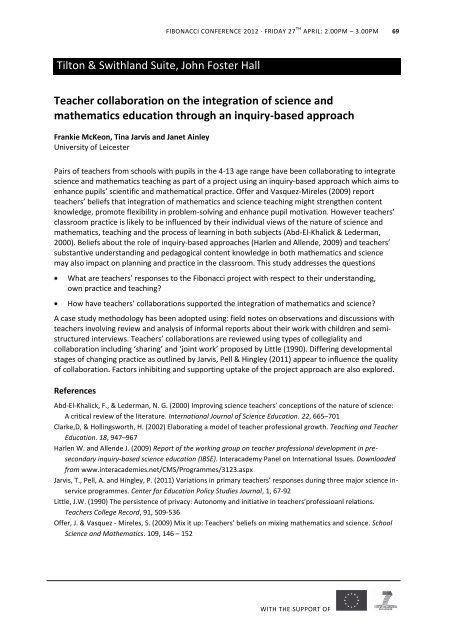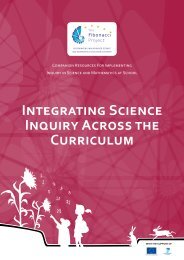disseminating inquiry-based science and ... - Fibonacci-Project
disseminating inquiry-based science and ... - Fibonacci-Project
disseminating inquiry-based science and ... - Fibonacci-Project
Create successful ePaper yourself
Turn your PDF publications into a flip-book with our unique Google optimized e-Paper software.
Tilton & Swithl<strong>and</strong> Suite, John Foster Hall<br />
FIBONACCI CONFERENCE 2012 ∙ FRIDAY 27 TH APRIL: 2.00PM – 3.00PM 69<br />
Teacher collaboration on the integration of <strong>science</strong> <strong>and</strong><br />
mathematics education through an <strong>inquiry</strong>-<strong>based</strong> approach<br />
Frankie McKeon, Tina Jarvis <strong>and</strong> Janet Ainley<br />
University of Leicester<br />
Pairs of teachers from schools with pupils in the 4-13 age range have been collaborating to integrate<br />
<strong>science</strong> <strong>and</strong> mathematics teaching as part of a project using an <strong>inquiry</strong>-<strong>based</strong> approach which aims to<br />
enhance pupils’ scientific <strong>and</strong> mathematical practice. Offer <strong>and</strong> Vasquez-Mireles (2009) report<br />
teachers’ beliefs that integration of mathematics <strong>and</strong> <strong>science</strong> teaching might strengthen content<br />
knowledge, promote flexibility in problem-solving <strong>and</strong> enhance pupil motivation. However teachers’<br />
classroom practice is likely to be influenced by their individual views of the nature of <strong>science</strong> <strong>and</strong><br />
mathematics, teaching <strong>and</strong> the process of learning in both subjects (Abd-El-Khalick & Lederman,<br />
2000). Beliefs about the role of <strong>inquiry</strong>-<strong>based</strong> approaches (Harlen <strong>and</strong> Allende, 2009) <strong>and</strong> teachers’<br />
substantive underst<strong>and</strong>ing <strong>and</strong> pedagogical content knowledge in both mathematics <strong>and</strong> <strong>science</strong><br />
may also impact on planning <strong>and</strong> practice in the classroom. This study addresses the questions<br />
What are teachers’ responses to the <strong>Fibonacci</strong> project with respect to their underst<strong>and</strong>ing,<br />
own practice <strong>and</strong> teaching?<br />
How have teachers’ collaborations supported the integration of mathematics <strong>and</strong> <strong>science</strong>?<br />
A case study methodology has been adopted using: field notes on observations <strong>and</strong> discussions with<br />
teachers involving review <strong>and</strong> analysis of informal reports about their work with children <strong>and</strong> semi-<br />
structured interviews. Teachers’ collaborations are reviewed using types of collegiality <strong>and</strong><br />
collaboration including ‘sharing’ <strong>and</strong> ‘joint work’ proposed by Little (1990). Differing developmental<br />
stages of changing practice as outlined by Jarvis, Pell & Hingley (2011) appear to influence the quality<br />
of collaboration. Factors inhibiting <strong>and</strong> supporting uptake of the project approach are also explored.<br />
References<br />
Abd-El-Khalick, F., & Lederman, N. G. (2000) Improving <strong>science</strong> teachers’ conceptions of the nature of <strong>science</strong>:<br />
A critical review of the literature. International Journal of Science Education. 22, 665–701<br />
Clarke,D, & Hollingsworth, H. (2002) Elaborating a model of teacher professional growth. Teaching <strong>and</strong> Teacher<br />
Education. 18, 947–967<br />
Harlen W. <strong>and</strong> Allende J. (2009) Report of the working group on teacher professional development in presecondary<br />
<strong>inquiry</strong>-<strong>based</strong> <strong>science</strong> education (IBSE). Interacademy Panel on International Issues. Downloaded<br />
from www.interacademies.net/CMS/Programmes/3123.aspx<br />
Jarvis, T., Pell, A. <strong>and</strong> Hingley, P. (2011) Variations in primary teachers’ responses during three major <strong>science</strong> in-<br />
service programmes. Center for Education Policy Studies Journal, 1, 67-92<br />
Little, J.W. (1990) The persistence of privacy: Autonomy <strong>and</strong> initiative in teachers’professioanl relations.<br />
Teachers College Record, 91, 509-536<br />
Offer, J. & Vasquez - Mireles, S. (2009) Mix it up: Teachers’ beliefs on mixing mathematics <strong>and</strong> <strong>science</strong>. School<br />
Science <strong>and</strong> Mathematics. 109, 146 – 152<br />
WITH THE SUPPORT OF




